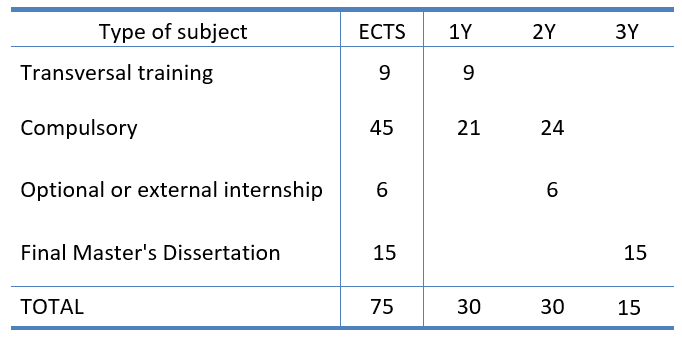 Vera (València) Campus, Universitat Politècnica de València
Vera (València) Campus, Universitat Politècnica de València
Master's Degree in Intelligent Transport Systems. MD-ITS
75 credits
Credit 35,34 €
(2024/2025)
0 openings
(2024/2025)
INTRODUCCIÓN
The weight of the transport sector in the Spanish economy is 2.9% of GDP. It is a sector with medium-low ICT implementation values, a paradox since transport and logistics are the areas in which the collaborative economy is more present and with an increasing impact. The combination of technologies, devices or applications such as cloud computing, mobile telephony, the Internet of Things, wearables, big data and social media is contributing to the digital transformation and redesign of the transport and logistics sectors, together with the infrastructures that support them.
Therefore, one of the key drivers of the employability of many graduates and professionals in the field of engineering in the ICT sector, the development of civil and other infrastructure, will be the Intelligent Transportation Systems sector (ITS) in the coming years.
The new sector professionals that have to deal with projects, applications, deployments, operations, maintenance or services, related to the analysis, design, execution, operation, maintenance and conservation of transport and logistics infrastructure and services, whether urban, interurban or long distance, will necessarily have to be trained in these areas.
The Master's Degree in Intelligent Transportation Systems will provide those specific skills, including the possibility of carrying out internships in infrastructure managers, companies within the sector, or services companies to those infrastructures, with a credit load of 75 ECT.
OBJECTIVES
The master's degree focuses on providing its students with sufficient mastery in electronic technologies and information and communications technologies that represent the technical basis of ITS systems, as well as the necessary concepts on transportation engineering and technical-economic management of engineering projects in this sector, in addition to leaning about the regulatory framework and its dynamics.
This will facilitate the employability of the master's students in a leading sector of the Spanish industry, such as Intelligent Transportation Systems (ITS), providing them with the specific and transversal competences required by sector companies.
STRUCTURE OF THE MASTER'S DEGREE
The master's has a general structure based on four types of subjects:
-
Transversal training. Due to the different profiles of the students, it is necessary to establish transversal training to standardise their knowledge. This transversal training consists of two subjects whose contents complement the two main student profiles and are carried out in the first four-months period within the first weeks of the academic year. This transversal training will be dictated by the Academic Committee based on the access degree and are considered as optional subjects. 9 credits will be offered in each of the subjects
-
Compulsory subjects. Structured in two modules with one subject each. There will be 21 credits in the first four-month period and 24 credits in the following four-month period.
-
Optional subjects or internship placement in companies. The students must complete a minimum of 6 credits of optional subjects that will deepen the knowledge about intelligent transport systems or carry out internships placements in sector companies. Subjects will be offered in the first or second four-month period, with a high percentage of them in the second period.
-
Final Master's Dissertation. It consists of an assignment that must be tutored by two lecturers who teach or are linked with the two different subjects of the compulsory block. The assignment must have a practical part and cover knowledge of both subjects. It will have a total of 15 credits
The following table shows the general structure of the curriculum in ECTS credits, by type of subject.

Recommended access profile:
The new student should be engineering graduates with the capacity to develop or enhance their professional activity in the Intelligent Transport Systems sector, a strategic area in both developed and emerging countries and in which Spanish companies have a very prominent presence.
The enrolment in the master's degree focuses on two types of students:
-
1. Graduates who are currently working and who need to complete their training in the face of new current and future opportunities.
-
Graduates in degrees related to Telecommunications Engineering and who work writing telecommunications projects in the rail, roads, port and/or new mobility solutions.
-
Graduates in Civil Engineering and Public Works that work executing transport infrastructures and/or operating and managing transport and logistics infrastructure and services or Graduates in Industrial Engineering and Informatics Engineering working in the application of communications in infrastructures and transport and logistics services.
-
2. Graduates in those degrees that grant access to official master's degrees in Telecommunications Engineering or in Civil Engineering, preferably. Access the master's can also be granted to graduates of bachelor's degrees that qualify for access in Industrial Engineering or Informatics Engineering.
ADMISSION CRITERIA
From the analysis of the current studies and the qualifications map, we believe the following groups or profiles are more suitable to join this master's degree:
-
Telecommunications Engineers, Master's Degree in Telecommunications Engineering, Graduates in Technology Engineering and Telecommunications Services, Master's Degree in Informatics Engineering, Degree in Informatics Engineering, Industrial Engineer specialised in electronics, Master's Degree in Industrial Engineering with access from the Degree in Industrial and Automatic Electronic Engineering, graduates in Industrial Electronics and Automation Engineering.
-
Civil Engineers, Public Works Technical Engineers.
Two itineraries are defined according to the degree of the student who is admitted to the MUSIT: Degree in Civil Engineering/Degree in Public Works Engineering/Master's Degree in Civil Engineering; Degree in Telecommunications Technology and Services Engineering/Degree in Informatics Engineering/Master's Degree in Telecommunications Engineering/Master's Degree in Informatics Engineering/Master's Degree in Industrial Engineering with access from Industrial and Automatic Electronic Engineering Degree/Industrial and Automatic Electronic Engineering Degree. Degree in Aerospace Engineering, Aircraft speciality.
For each itinerary, transversal training is included in the subjects: Communications Technologies and Transportation Engineering, as follows:
-
Teleco itinerary/Informatics/Industrial/Aerospace: Transportation and Mobility. Road networks, traffic and road safety, Port management and maritime traffic.
-
GIC/GIOP/MUICCP Itinerary: Electronic systems, Communications systems, Communications networks.








